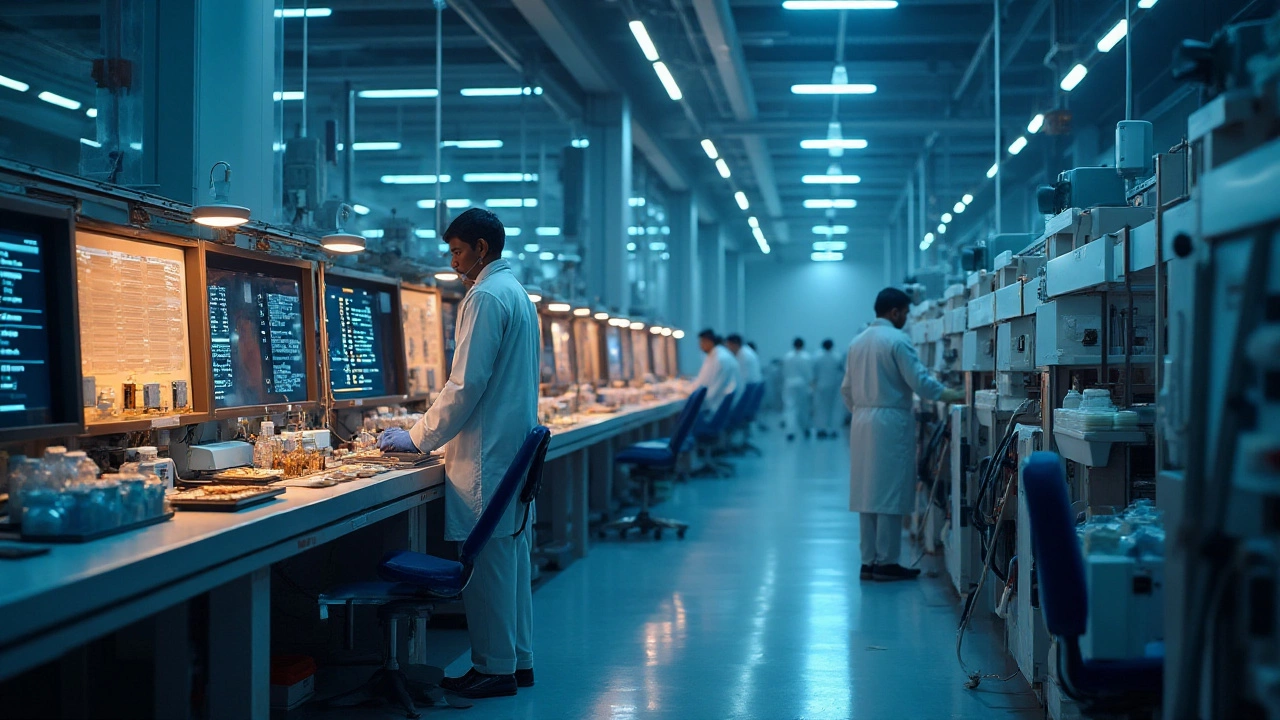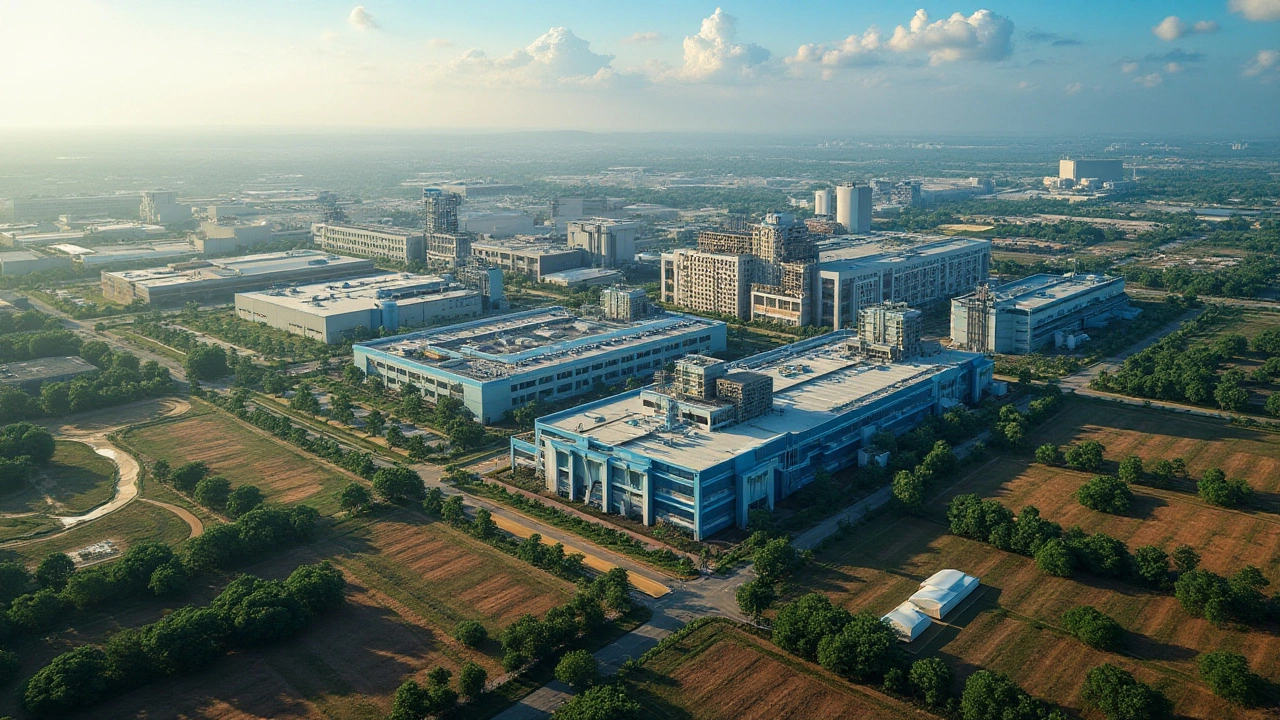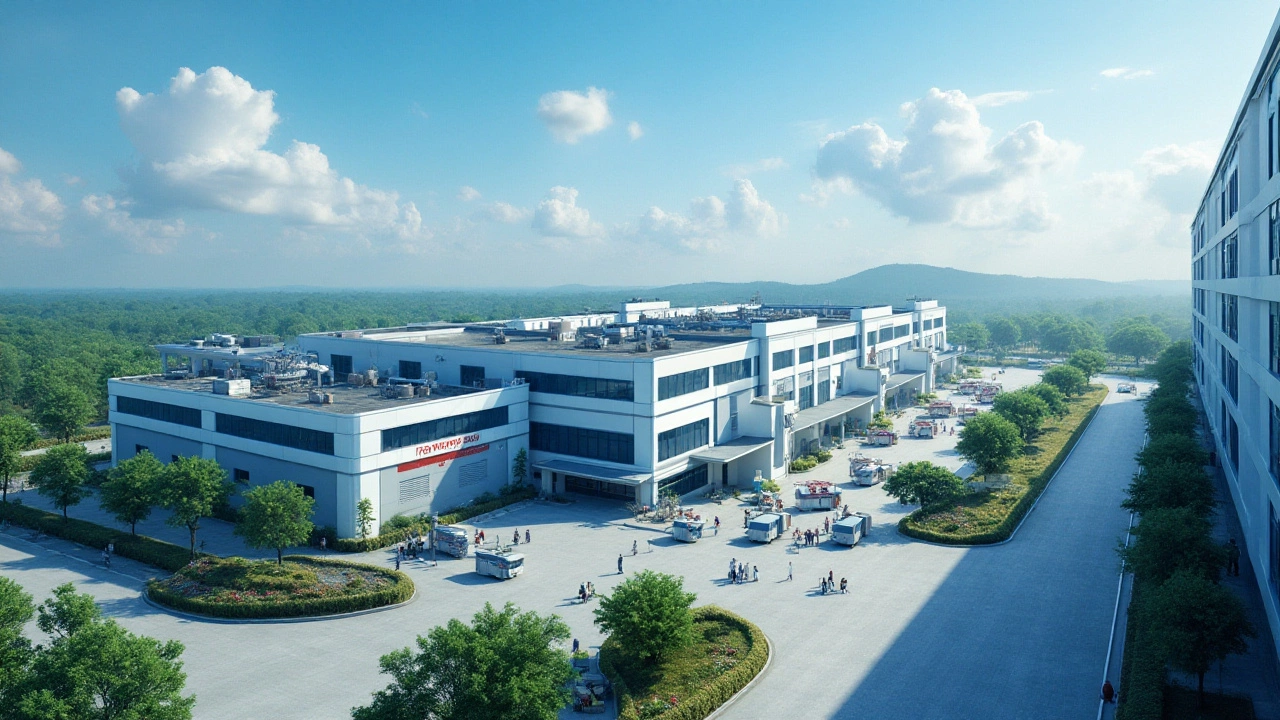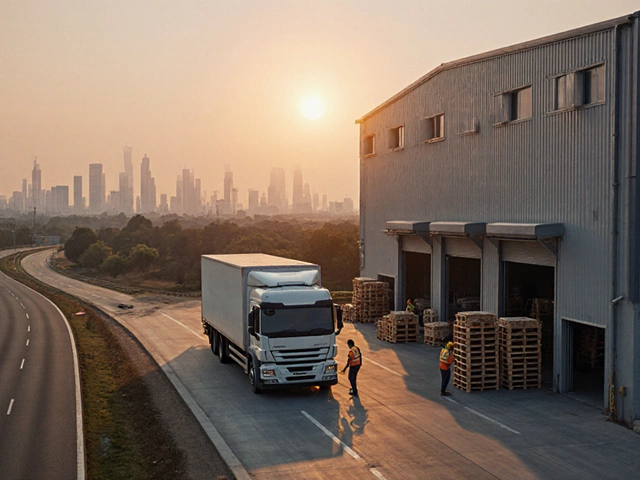India has cemented its position as a major player in the global pharmaceutical landscape, and its manufacturing plants are at the heart of this success story. In recent years, India’s pharmaceutical manufacturing facilities have been making waves, not only for their sheer scale but also for their innovations and contributions to medical research and development.
From traditional medicines to cutting-edge biotechnology, these plants are the backbone that supports both domestic healthcare needs and international markets. With a focus on quality and efficiency, many Indian pharmaceutical manufacturers have become reliable partners across the globe.
This article takes a closer look at the top pharmaceutical manufacturing hubs in India, exploring what sets them apart and the role they play on the world stage. Join us as we delve into how these giants drive India’s pharma sector forward and shape the future of medicines worldwide.
- India's Pharmaceutical Giants
- Technology and Innovation
- Locations and Their Specialties
- Global Impact and Exports
- Future Trends in Indian Pharma
India's Pharmaceutical Giants
India's pharmaceutical industry is renowned worldwide for its immense pharma manufacturing capabilities. Often referred to as the "pharmacy of the world," India has carved a niche in producing affordable, high-quality medicines. The industry comprises thousands of registered plants, with key players making substantial contributions both in terms of revenue and impact. One such giant in the field is Cipla, known for its pivotal role in providing affordable HIV medications to countries in need. Alongside Cipla, companies like Sun Pharmaceuticals and Dr. Reddy’s Laboratories represent the prowess and innovation that define the Indian pharmaceutical space. These companies have not only built a vast domestic footprint but also a formidable global presence by exporting to over 200 countries.
Sun Pharmaceuticals stands as the largest pharmaceutical company in India and the fourth largest specialty generic pharmaceutical company in the world. The company has made significant strides in the integration of modern technology in drug manufacturing. With state-of-the-art facilities, Sun Pharmaceuticals continues to focus on innovation in therapeutic segments such as cardiology, neurology, and gastroenterology. This dedication to therapeutic advancement is reflected in its yearly investments in research and development, which have significantly bolstered its standing in the global market. According to the company, "Our focus on R&D and patient-centric drug discovery continues to drive us forward."
India's pharma giants are not just limited to domestic innovations but are also stepping up as key players internationally. Notably, Dr. Reddy’s Laboratories has made significant global investments, particularly in biosimilars and generic medicine manufacturing facilities strategically located to serve various international markets. Its presence in Russia, the USA, and Europe has been bolstered by its commitment to technology-driven processes that ensure the production of safe, reliable medications. To demonstrate the size of its impact, a study shows that India supplies over 50% of the global demand for various vaccines, catering to international needs on a remarkable scale. It is not uncommon for Indian pharmaceutical companies to be among the top global producers of essential drugs and vaccines, proving their capabilities in a competitive field.
India’s pharmaceutical sector thrives on its ability to balance cost-effectiveness and quality—essential elements in the competitive global market. This balance is achieved through a combination of skilled labor, investment in cutting-edge technology, and strategic partnerships that leverage local manufacturing advantages. These strategies provide Indian pharmaceutical companies with the ability to penetrate markets that demand high standards at economical prices. By expanding their market reach and enhancing their manufacturing capacities, India's top pharma plants not only contribute significantly to the economic framework but also meet critical healthcare requirements worldwide. As demand for accessible medication continues to grow, these industry giants remain poised to take even larger strides in the burgeoning pharmaceutical landscape.
Technology and Innovation
In the realm of pharmaceutical manufacturing, India shines brightly with its unwavering commitment to technology and innovation. The nation is home to state-of-the-art facilities that lead the charge in producing affordable and effective medicines on a massive scale. These plants utilize advanced machinery and cutting-edge processes designed to enhance efficiency, safety, and precision in drug manufacturing. As part of their innovation strategies, many manufacturers are increasingly incorporating automation and AI-driven technologies, drastically reducing production times while maintaining the highest quality standards.
A standout feature of India's pharmaceutical sector is its investment in biosimilars and novel drug delivery systems. Biosimilars, which are akin to generic biological products, help drive down costs and increase accessibility for critical treatments worldwide. These efforts position Indian manufacturers as leaders in the global shift towards biologics. In line with the international push for personalized medicine, Indian facilities are also expanding their capabilities to cater to individualized treatments, ensuring that medications are more effective and better tailored to patient populations.
The integration of IoT (Internet of Things) technologies in pharmaceutical plants has also started gaining traction. Sensor-embedded devices and smart manufacturing systems monitor environmental conditions, equipment performance, and quality control processes in real-time, promoting transparency and reliability. This evolution in technology not only ensures compliance with international regulatory standards but also enhances trust among global partners and clients. A report by the Indian Pharmaceutical Alliance noted that “embracing smart technologies is crucial for the continued growth and sustainability of India's pharma industry.”
Big data analytics further underpin the strategies of leading Indian pharmaceutical companies. By leveraging data-driven insights, manufacturers can optimize everything from supply chain logistics to R&D pathways, improving decision-making and resource allocation. Statistical analyses of market trends and patient needs also empower these companies to stay ahead in a competitive landscape, ensuring they meet global demands efficiently and effectively. While embracing technological advances, these manufacturers remain committed to their ethical obligations, ensuring that innovation does not compromise patient safety or product integrity.
A growing focus on sustainable practices is emerging alongside technological innovation. Many top-tier pharma plants in India are now adopting green technologies such as energy-efficient equipment, waste reduction programs, and renewable energy sources. This commitment to environmental stewardship not only reduces the carbon footprint of the pharmaceutical industry but also meets the expectations of an increasingly eco-conscious global clientele. Manufacturers who embrace sustainable practices stand to gain significant competitive advantages in the global market, highlighting India's leadership role in fostering both technological and ecological advancements in the pharmaceutical sector.

Locations and Their Specialties
India's pharmaceutical landscape boasts a wide array of manufacturing plants spread across the country, each contributing uniquely to this vital sector. Maharashtra, often considered the hub of India's pharma industry, houses several major manufacturing units. These facilities excel in producing generic drugs, with Mumbai and Pune leading the charge. Their significance grows with the fact that India's pharmaceutical exports crossed a remarkable USD 24 billion recently, and Maharashtra is a crucial contributor to this figure.
Next up is Andhra Pradesh, a state that has carved a niche for itself in drug manufacturing, especially for anti-malarial and anti-retroviral medicines. The industrial cities like Visakhapatnam and Hyderabad are beacons of innovation and development in pharmaceutical technology. Some of the most significant investments in biotechnology research are happening here, showcasing the region's commitment to evolving healthcare technologies. This is a testament to the commitment of Indian pharma companies to remain globally competitive while enhancing domestic healthcare.
Karnataka features prominently with its capital Bangalore, famous for its biotech and life science advancements. A notable area of specialization here is in the production of vaccines, a sector that has received considerable attention due to recent global demand surges. According to industry expert Dr. Ramesh Lakshman, "The strides we have made in vaccine production are critical not just for India, but for the whole world.”
The impact of India’s manufacturing capacity on global vaccine supply cannot be overstated.
In Gujarat, the city of Ahmedabad is a center for producing active pharmaceutical ingredients (APIs), which are the crucial components of any drug formulation. There’s a strong network of these production facilities throughout the state, serving both local needs and international markets. It's noteworthy that the state accounts for a third of India’s pharmaceutical exports, reflecting its pivotal role.
Both West Bengal and Tamil Nadu have also made notable contributions. Kolkata, with its legacy of pharmaceutical prowess, continues to be a base for some of the historical manufacturers known for their ayurvedic and allopathic drug combinations. Meanwhile, Chennai in Tamil Nadu is rapidly becoming an epicenter for research and development in biopharmaceuticals, focusing on next-generation drug development techniques that emphasize personalized medicine.
The diversity of specialties across these locations showcases the extraordinary lengths to which Indian pharmaceutical manufacturers go in addressing both traditional medicinal needs and cutting-edge biotechnology challenges. As India continues to push forward, these industrial hubs will undoubtedly remain integral to its sustained leadership in global pharma.
Global Impact and Exports
India stands as a colossal force in the pharmaceutical industry, much like a seasoned athlete that has claimed mastery through years of disciplined practice. The country's pharmaceutical sector is not just a provider of medicines within its borders, but a formidable player on the international stage. Indian pharmaceutical companies have carved a niche for themselves in the global market as a trusted supplier of generic medicines. The affordability and efficacy of these drugs are pivotal in addressing global healthcare challenges, especially in developing countries where cost-effective treatment is crucial.
Renowned as the "Pharmacy of the World," India's pharmaceutical industry supplies over 50% of global demand for many vaccines, 40% of generic demand in the United States, and 25% of all medicines in the United Kingdom. The country's unique position as a leading manufacturer of pharma products stems from its vast pool of scientific talent and infrastructure. Not only does this bring life-saving drugs to populations worldwide, but it also places India as the third-largest producer of medicines by volume globally. Interestingly, with the rise of biologics, the country continues to adapt, enhancing its capacity for more complex medicines such as biosimilars.
The rise of Indian pharmaceuticals in the global arena is a testament to the country’s resourcefulness and vision. In a report by the India Brand Equity Foundation (IBEF), it is projected that by 2030, India's pharma exports would reach 120 billion USD, reflecting a robust growth trajectory. This growth spills beyond economic clout and into impactful social presence—saving millions of lives through the accessible and widespread distribution of crucial medications. As the focus shifts to precision medicines, India's pharmaceutical exports are expected to include not only bulk drugs but also nanoscale therapies and personalized medicine solutions.
Efforts from regulatory bodies and government initiatives have bolstered this growth. Campaigns like "Make in India" aim to ensure that the country remains a manufacturing giant, attracting international investors to set up plants within its borders. This ultimately means more jobs and greater production capabilities, further solidifying India’s pivotal role in the pharmaceutical sector. The dedication shines through as India deploys a substantial part of its manufacturing capacity specifically for international supply, ensuring steady provision in times even as critical as pandemics.
The vast array of drugs manufactured in India often exceeds quality benchmarks set by established markets, a fact epitomized by companies like Cipla, Dr. Reddy's Laboratories, and Sun Pharmaceutical Industries. Their adherence to WHO Good Manufacturing Practices (GMP) is a compelling reflection of India's commitment towards maintaining high manufacturing standards. A spokesperson from the Indian Pharmaceutical Alliance once noted, “Our mission is to make quality medicines accessible to all at a fraction of the cost.” This dedication translates into the exporting of high-standard medicines at competitive prices, a unique feat positioned in the backdrop of a rapidly evolving medical landscape globally.

Future Trends in Indian Pharma
The Indian pharmaceutical industry is on the cusp of significant transformation, driven by technological advancements, evolving healthcare demands, and a burgeoning desire for sustainable practices. As we dive into what the future holds, it becomes evident that innovation is at the forefront. The use of artificial intelligence and machine learning is revolutionizing how drugs are discovered and tested. These technologies enable more efficient processing of vast amounts of data, facilitating faster clinical trials and potentially reducing costs. With India positioning itself as a global leader in pharma, such advancements will play a pivotal role in maintaining its competitive edge.
Pharmaceutical manufacturing in India is witnessing a shift towards biopharmaceuticals and personalized medicine. The demand for more targeted therapies, which account for individual genetic differences, is rising. This shift is partly due to a growing middle-class population that is increasingly aware of and demands advanced medical treatments. This trend in personalized healthcare is poised to reshape how pharmaceutical companies approach drug development and marketing.
Environmental sustainability is becoming a significant consideration for the pharma sector in India. The industry recognizes the imperative to minimize its ecological footprint while meeting production demands. Companies are increasingly investing in green technologies and practices that reduce waste and energy consumption. This not only helps preserve the environment but also aligns with the global move towards more sustainable business models. With global regulatory norms tightening around environmental standards, Indian pharmaceutical manufacturers are likely to adopt even more green practices in the coming years.
The Economist noted, "India's pharmaceutical industry is not just a supplier to the world but a pioneer in sustainable manufacturing practices."
Emerging markets are set to play a crucial role in the future of Indian pharmaceutical exports. As developing countries enhance their healthcare infrastructures, they will demand more medicines both in terms of volume and variety. The global impact of India’s robust manufacturing capabilities cannot be understated. It allows the country to offer affordable medications to corners of the world where high-cost alternatives aren’t viable, thereby solidifying India's reputation as the “pharmacy of the world.”
Overall, fostering an ecosystem that supports innovation through robust policies and infrastructure will be vital. Government initiatives that incentivize research and development, along with public-private partnerships, can provide the necessary boost for sustained growth. With agile regulatory environments and improved ease of doing business, Indian pharma companies are poised to attract more foreign direct investments, which will further augment the sector's capabilities.









